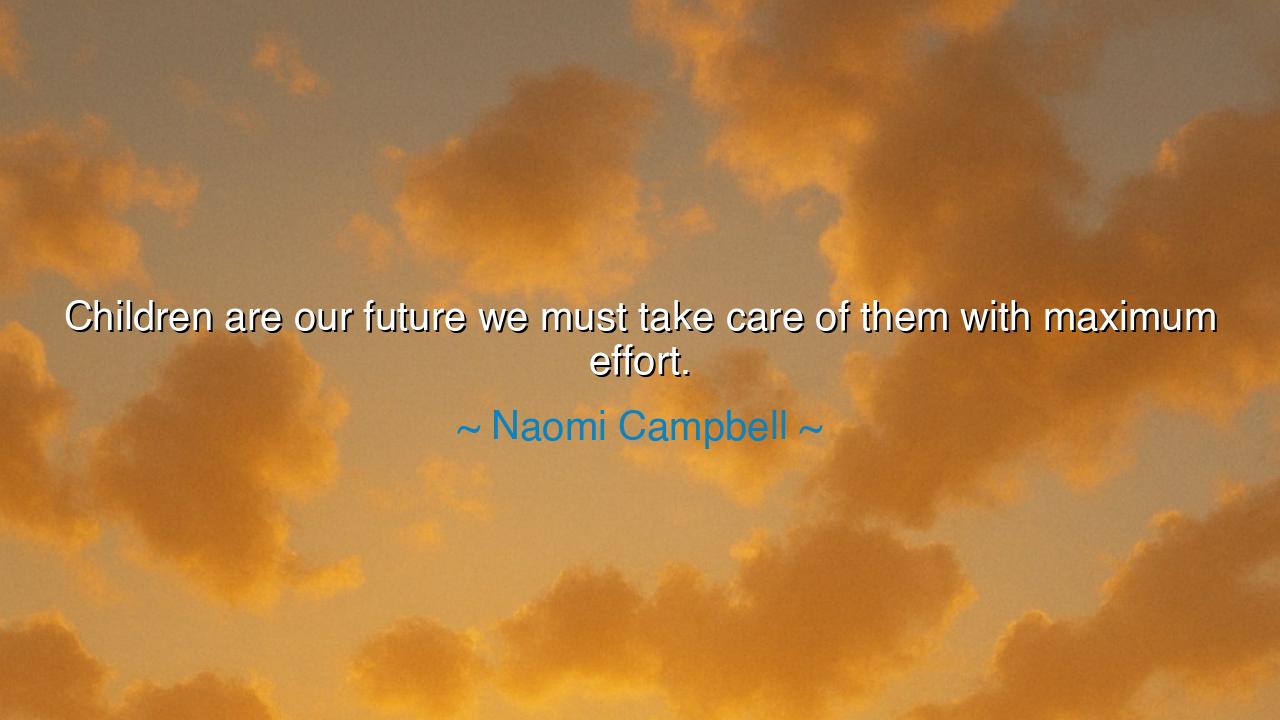
Children are our future we must take care of them with maximum






In the grand tapestry of life, there is a timeless truth: the future of any society, of any people, is entrusted to the young. Naomi Campbell’s words, "Children are our future, we must take care of them with maximum effort," strike at the very heart of this responsibility. The children of today will become the leaders, creators, and thinkers of tomorrow. To neglect them, to fail in providing for their nurturing, is to forsake the very future of our world. These young souls are not just the heirs to what we leave behind, but the architects of what is yet to come. They carry within them the seeds of our hopes and dreams, and it is through their care and guidance that those seeds will either flourish or wither.
In the ancient world, the role of children was held in sacred reverence. Plato, in his work "The Republic," spoke of the importance of education and the upbringing of the young. He argued that the state must invest in the care of its youth, for they are the future citizens who will shape the very structure of society. To neglect them, he believed, was to doom society to stagnation and decline. The ancient Greeks understood that to give children the proper foundation was not just a matter of personal responsibility but a matter of societal survival. The future of Athens was not secured by the might of its warriors alone, but by the wisdom and integrity of the next generation. Naomi Campbell's words echo this ancient wisdom, reminding us that the future rests in the hands of those who come after us.
Consider the story of Socrates and his role as a teacher in Athens. Socrates devoted his life to the education and guidance of the youth, not only imparting knowledge but encouraging them to think critically, to challenge norms, and to pursue wisdom. He believed that the true power of a society lay not in its wealth or conquests, but in the strength of its future generations. His method of questioning, the Socratic method, was aimed at awakening the minds of the young, helping them to see the world not just as it was, but as it could be. By investing in the youth, Socrates believed he was shaping the future of Greece itself, ensuring that the nation’s intellectual and moral legacy would endure.
In more modern history, we see similar lessons in the efforts of those like Nelson Mandela, who understood that the youth are the cornerstone of any nation's future. After his release from prison, Mandela dedicated much of his life to the education and upliftment of South Africa’s young people, recognizing that their minds were the battleground on which the future of a free South Africa would be won. His belief that the education and empowerment of children would lead to a just and prosperous future was a guiding principle in his post-apartheid efforts. Mandela, like Campbell, knew that the future was shaped not only by political movements or economic systems, but by the hearts and minds of the next generation.
Naomi Campbell’s message underscores the urgency of this task. It is not enough to provide for the physical needs of children—food, shelter, and safety—though these are essential. We must also give them love, guidance, and opportunity. The greatest investment we can make is in their potential, in their ability to dream, to learn, and to create. In the ancient world, the greatest societies were those that understood that the nurturing of youth was not just a familial responsibility but a societal one. The Romans built great schools and forums for learning, understanding that their empire could only stand if the next generation was equipped to lead and govern wisely.
The lesson here is not just about the importance of the youth, but about the duty that we, as individuals and as a collective, have to the children of our world. The future we seek is not something that will simply unfold on its own. It must be cultivated with intention, care, and an unwavering commitment to providing every child with the tools to succeed. The effort must be maximal, as Campbell emphasizes, for only through diligent work, unyielding compassion, and an investment in education and opportunity can we ensure that the future is one of promise, progress, and peace.
In practical terms, this means that we must actively participate in shaping the lives of young people, whether through education, mentorship, or advocacy for policies that protect their rights and opportunities. We cannot afford to be passive in the care of our children, for they are not only our legacy, but the key to our collective future. Let us, like the great thinkers of the past, invest in the nurturing of the next generation, providing them with the wisdom, support, and love they need to build a future better than the one we inherit. This is the greatest gift we can give to the world, and the surest way to ensure that the future is one of hope, strength, and justice.






AAdministratorAdministrator
Welcome, honored guests. Please leave a comment, we will respond soon